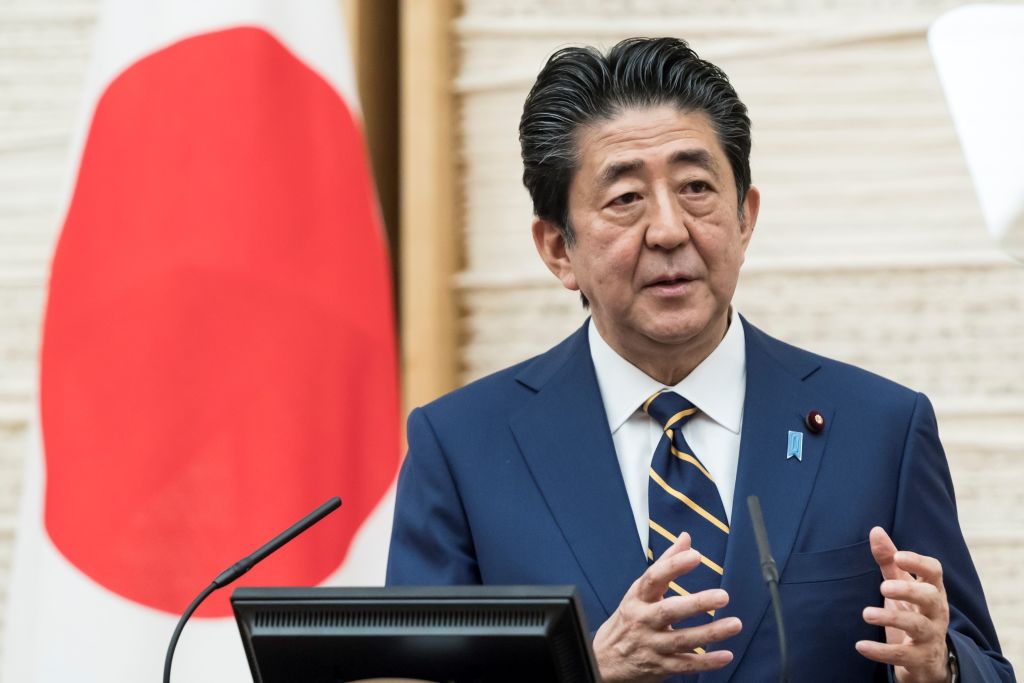Japan declares state of emergency as coronavirus cases climb, but experts fear 'it's too late'


A free daily email with the biggest news stories of the day – and the best features from TheWeek.com
You are now subscribed
Your newsletter sign-up was successful
Japanese Prime Minister Shinzo Abe has officially declared a state of emergency in seven prefectures over the coronavirus crisis amid a surge in new cases.
Abe on Tuesday declared a state of emergency that will last until May 6 in prefectures including Tokyo, where residents had already been urged to avoid nonessential travel and which recently went from reporting fewer than 20 new cases a day on March 25 to reporting nearly 150 new cases on Sunday, per NPR.
Residents are being requested to stay home but not actually ordered to, and those who don't do so won't be penalized, The Associated Press reports. "Civil liberties protections in Japan don't allow authorities to issue jail terms or fines for non-compliance, so a heavy dose of peer pressure and the weight of the emergency declaration are being deployed instead as a cudgel," CBS News writes. The state of emergency "hands powers to local governments to try to contain the spread of the virus that causes COVID-19, including by urging residents to stay at home," Bloomberg notes.
The Week
Escape your echo chamber. Get the facts behind the news, plus analysis from multiple perspectives.

Sign up for The Week's Free Newsletters
From our morning news briefing to a weekly Good News Newsletter, get the best of The Week delivered directly to your inbox.
From our morning news briefing to a weekly Good News Newsletter, get the best of The Week delivered directly to your inbox.
During a news conference on Monday, Abe said, "We need your cooperation to prevent an explosive surge."
But some fear this is "too little, too late," arguing the Japanese government "has dithered in the face of an explosion in infections in the capital, and is still reluctant to impose the sort of extreme measures necessary to contain the virus — largely over concerns about the economic impact," The Washington Post writes.
Kenji Shibuya, director of the Institute for Population Health at King's College, London, told the Post, "It's too late. Tokyo has already entered an explosive phase, and the only way to stop the collapse in health care was to lock down the city as early as possible." Abe told parliament this week the government "will not lock cities down as has been done overseas."
A free daily email with the biggest news stories of the day – and the best features from TheWeek.com
Brendan worked as a culture writer at The Week from 2018 to 2023, covering the entertainment industry, including film reviews, television recaps, awards season, the box office, major movie franchises and Hollywood gossip. He has written about film and television for outlets including Bloody Disgusting, Showbiz Cheat Sheet, Heavy and The Celebrity Cafe.
-
 The Olympic timekeepers keeping the Games on track
The Olympic timekeepers keeping the Games on trackUnder the Radar Swiss watchmaking giant Omega has been at the finish line of every Olympic Games for nearly 100 years
-
 Will increasing tensions with Iran boil over into war?
Will increasing tensions with Iran boil over into war?Today’s Big Question President Donald Trump has recently been threatening the country
-
 Corruption: The spy sheikh and the president
Corruption: The spy sheikh and the presidentFeature Trump is at the center of another scandal
-
 Trump HHS slashes advised child vaccinations
Trump HHS slashes advised child vaccinationsSpeed Read In a widely condemned move, the CDC will now recommend that children get vaccinated against 11 communicable diseases, not 17
-
 FDA OKs generic abortion pill, riling the right
FDA OKs generic abortion pill, riling the rightSpeed Read The drug in question is a generic version of mifepristone, used to carry out two-thirds of US abortions
-
 RFK Jr. vaccine panel advises restricting MMRV shot
RFK Jr. vaccine panel advises restricting MMRV shotSpeed Read The committee voted to restrict access to a childhood vaccine against chickenpox
-
 Texas declares end to measles outbreak
Texas declares end to measles outbreakSpeed Read The vaccine-preventable disease is still spreading in neighboring states, Mexico and Canada
-
 RFK Jr. shuts down mRNA vaccine funding at agency
RFK Jr. shuts down mRNA vaccine funding at agencySpeed Read The decision canceled or modified 22 projects, primarily for work on vaccines and therapeutics for respiratory viruses
-
 Measles cases surge to 33-year high
Measles cases surge to 33-year highSpeed Read The infection was declared eliminated from the US in 2000 but has seen a resurgence amid vaccine hesitancy
-
 Kennedy's vaccine panel signals skepticism, change
Kennedy's vaccine panel signals skepticism, changeSpeed Read RFK Jr.'s new vaccine advisory board intends to make changes to the decades-old US immunization system
-
 Kennedy ousts entire CDC vaccine advisory panel
Kennedy ousts entire CDC vaccine advisory panelspeed read Health Secretary RFK Jr. is a longtime anti-vaccine activist who has criticized the panel of experts
